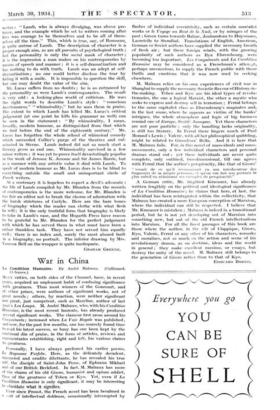War in China
MANY critics, on both sides of the Channel, have, in recent years, acquired an unpleasant habit of confusing significance with greatness. Thus most winners of the Goncourt, and of other prizes, were authors of significant works, not of great novels ; others, by reaction, were neither significant nor great, just competent, such as Mazeline, author of last year's Les Loupe. M. Andre Malraux, who, with his Condition Iluntuine, is the most recent laureate, has already produced several significant works. The clamour first arose around his Conquirants ; increased when La Voie Royale was published; and now, for the past few months, one has scarcely found time to read his latest success, so busy has one been kept by the continual din of praise, in the form of articles, reviews and commentaries establishing, right and left, his various claims to greatness.
Personally, I have always preferred his earlier poems, Le Royaume Farfelu. Here, as the delicately decadent, mannered and erudite dilettante, he has revealed his true self, the disciple of Saint-John Perse, of Ephraim Mfichael and of our British • Beckford. In fact, M. Malraux has more of the charm of his old Gisors, humanist and opium addict, than of the greatness of Tchen or Kyo. Yet, even if La Condition Huntaine is only significant, it may be interesting to elucidate what it signifies.
Ever since Proust, the French novel has been becalmed in a port of intellectual doldrum, occasionally interrupted by flashes of individual eccentricity, such as certain surrealist works or le Voyage an Bout de la Null, or by mirages of the past ; Green turns towards Balzac, Joulaandeau to Huysmans, Lacretelle to Stendhal. Translations of English, American, German or Soviet authors have supplied the necessary breath of fresh air ; but these foreign winds, with the growing popularity of such authors as Ilya Ehrembourg, were becoming too important. Les Conquerants and La Condition Humaine may be considered as a Frenchman's attempt, perhaps unconscious, to supply the French public with those thrills and emotions that it was now used to seeking elsewhere.
M. Malraux relies on his own experiences of civil war in Shanghai to supply the necessary Sovietic flavour of History-in- the-making. Tchen and Kyo arc his ideal types of revolu- tionaries, the one a logical Marxist, the other a mystic who seeks to express and destroy self in terrorism ; Ferral belongs to the same capitalist class as Ehrembourg's magnates and, in the last scene, where he appears as victim of the banks' intrigues, the whole atmosphere and logic of big business remind one of Europe, Societe Anonytne. Yet these characters arc not pure pastiche ; only the handling lacks originality, is still too literary. In Fermi there lingers much of Paul Morand's Lewis ; Valerie, with all her philosophical quibbling, might be related to Giraudoux' Bella. And it is here that M. Malraux fails. For, in this novel of mass-ideals and mass- movements, only a few individual characters and personal dramas stand out ; yet these individuals are never quite complete, only outlined, two-dimensional, till one agrees with Ferral that the author's perspicacity, like that of Gisors' " venait de co qu'il reconnaissait en son interlocuteur des fragments do sa propre personne, et qu'on eut fait son portrait le plus subtil en reunissant ses excinples de perspicacity."
A German critic, Mr. Siegfried Kracauer, has already written lengthily on the political and ideological significance of La Condition Humaine; he claims that here, at last, the individual has been reintegrated within the collectivity, that Malraux has created a more European conception of Marxism, where the individual can still be respected. I believe that Mr. Kracauer is mistaken ; Malraux is indeed in a transitional period, but he is not yet developing out of Marxism into something new, but out of the old French intellectualism into Marxism. For all the finest passages of this book are those where the author, in the role of Clappique, Gisors, Kyo, Valerie, Ferral or any other of his characters, remarks and moralizes, not so much on the action and scene of his revolutionary drama, as on doctrine, ideas and the world in general ; they make excellent maxims, or essays, but destroy the unity of the novel. M. Malraux still belongs to the generation of Gisors rather than to that of Kyo.
EDOUARD RODITI.








































 Previous page
Previous page